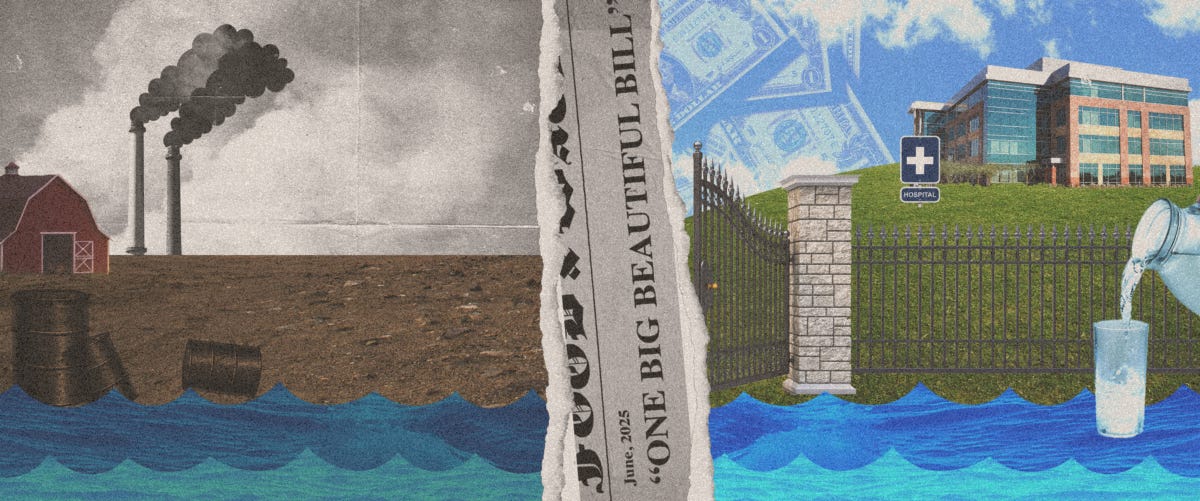Trump's BUD: Big Ugly Disaster
Why Trump's "Big Beautiful Bill" is immoral and will destroy America
My Fellow Democracy Defenders,
The Big Beautiful Bill (BBB) is a Big Ugly Disaster (BUD). The orange felon’s BUD prioritizes wealth accumulation for the already affluent while neglecting the needs of vulnerable populations. It will exacerbate inequality, undermine social welfare systems, and cause long-term environmental and societal consequences. This essay explores the moral failings of the BUD by examining its impact on income inequality, public services, and ethical governance.
Exacerbating Income Inequality
One of the most glaring moral flaws of the BUD lies in its disproportionate benefits to the wealthiest individuals and corporations. By slashing taxes for high-income earners and large businesses, the proposal effectively redistributes resources upward, further concentrating wealth in the hands of an elite few. History provides ample evidence that such policies do little to trickle down to ordinary Americans; instead, they widen the chasm between rich and poor. According to data from previous Republican administrations, including those of Ronald Reagan and George W. Bush, significant tax cuts have consistently led to increased income disparities without delivering promised widespread prosperity.
From a moral standpoint, prioritizing the interests of the wealthy over the struggling middle class and impoverished communities reflects a failure to uphold principles of fairness and justice. A just society must strive to reduce inequality, not deepen it. When government policies favor the privileged at the expense of the marginalized, they perpetuate systemic injustice and erode trust in democratic institutions. The BUD thus represents a betrayal of the common good, privileging greed over compassion and self-interest over solidarity.
Undermining Public Services
Another critical issue with the proposal is its potential to undermine essential public services through reduced revenue. Tax cuts inevitably lead to budget deficits unless accompanied by equivalent spending reductions—cuts that often target programs vital to low-income families, such as healthcare, education, and housing assistance. Programs like Medicaid, food stamps, and Pell Grants are lifelines for millions of Americans who rely on them to meet basic needs and access opportunities for upward mobility. By starving these programs of funding, the BUD places additional burdens on those least able to bear them.
The morality of any policy must be judged by how well it serves the most vulnerable members of society. Yet, under this proposal, the sacrifices demanded fall disproportionately on the backs of the disadvantaged. For example, children in underfunded schools will face even greater barriers to educational attainment, while seniors and disabled individuals may lose access to affordable healthcare. These outcomes are not merely unfortunate side effects but foreseeable results of prioritizing corporate profits and individual wealth over collective well-being. Such choices reflect a profound disregard for human dignity and the social contract that binds us together as a nation.
Ignoring Long-Term Consequences
Beyond its immediate impacts, the BUD also fails to consider broader, long-term consequences, particularly regarding climate change and fiscal sustainability. Deregulation—a cornerstone of the proposal—often weakens environmental protections, allowing industries to exploit natural resources recklessly and exacerbate ecological degradation. Climate change poses existential threats to humanity, yet the proposed policies ignore scientific consensus and prioritize short-term economic gains over the planet's future health. Sacrificing environmental stewardship for profit demonstrates a lack of intergenerational responsibility, betraying both current and future generations.
Furthermore, the financial irresponsibility embedded in the proposal raises serious ethical concerns. Large-scale tax cuts inevitably increase national debt, burdening future taxpayers with the obligation to repay borrowed funds. Rather than addressing structural challenges like infrastructure repair or sustainable energy development, the bill squanders resources on unsustainable giveaways to the wealthy. This shortsightedness reflects a failure to govern responsibly, prioritizing political expediency over prudent planning.
An Ethical Progressive Alternative
To counter the immorality of the BUD, policymakers must champion progressive taxation, robust public investment, and equitable distribution of resources. Progressive tax systems ensure that those with greater means contribute their fair share, enabling governments to fund essential services and address pressing societal issues. Investing in education, healthcare, renewable energy, and affordable housing can create lasting benefits for all citizens, fostering a more inclusive and resilient economy. True leadership involves making difficult decisions that prioritize the common good over narrow special interests—a standard conspicuously absent from the BUD.
BUD embodies a morally bankrupt approach to governance, one that privileges the wealthy at the expense of the vulnerable, undermines public services, and ignores long-term consequences. Its emphasis on unchecked capitalism and deregulation stands in stark contrast to the values of equity, sustainability, and compassion necessary for a just society. As citizens, we must demand policies that reflect our shared humanity and commitment to leaving no one behind. To embrace the BUD would be to abandon these principles entirely, choosing instead a path defined by greed, inequality, and shortsightedness. In doing so, we risk losing sight of what truly makes a nation great: its ability to care for all its people, not just the fortunate few.








This is not trump's bill, it's the GOP's bill. They could have stopped it but chose not to. Lisa Murkowski could have stopped it all by herself but choose not to. Let's start pressuring mainstream media (like home town TV stations and newspapers) to hold the GOP Congress responsible.
Greedy as all getout: https://www.nytimes.com/2025/07/02/us/trump-finances-crypto.html?unlocked_article_code=1.TU8.GmLk.Ml-T-CStWejC&smid=url-share